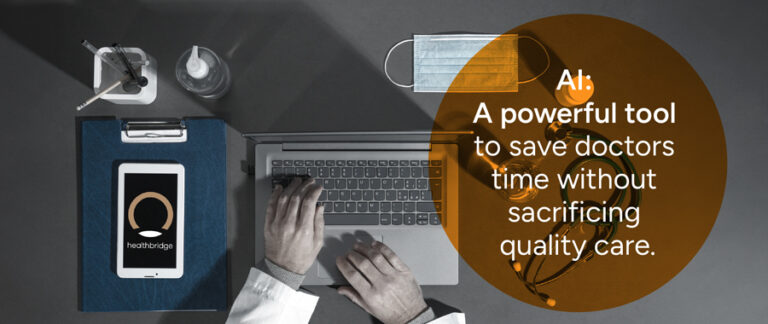
AI: A powerful tool to save doctors time without sacrificing quality care
General Practitioners (GPs) are no strangers to the pressure cooker of modern healthcare. With medical knowledge doubling every 72 days, & patient expectations at an all-time high, it’s clear that time is the most precious commodity for doctors today. But what if AI could offer a solution—not as a replacement, but as an assistant?
Luis da Silva, CEO of Healthbridge, recently addressed this question at the KZN Doctors Healthcare Coalition (KZNDHC) medical conference. Speaking to doctors and key personnel from the Department of Health, it was clear that AI has become more than just a buzzword. It is now a real tool that can help GPs regain control over their time while improving the quality of patient care.
“As doctors, you’re not just fighting illness; you’re fighting time,” da Silva explained during his presentation. “AI has the potential to give you back some of that time – without compromising on care.”
The time crunch: A crisis in quality & revenue
Doctors today are caught in a balancing act: ensuring high-quality patient care while generating revenue through consultations. The equation is straightforward: the quality of care is determined by a doctor’s expertise, the information at their disposal, & the time spent with the patient. Similarly, revenue hinges on the number of consultations & the billing per consult. However, both quality & revenue are ultimately constrained by the finite number of hours in a day.
The problem? Many of those hours are swallowed up by administrative tasks that detract from time with patients. Among the most time-consuming tasks are:
- Manually taking consultation notes
- Collecting & organizing patient information
- Preparing & sending referral & motivation letters
- Sending messages & files to patients
- Scripting medications
In Luis da Silva’s words: “The administrative burden is suffocating for many GPs. Every minute spent on paperwork is a minute lost with a patient. AI offers us a way to reclaim that time.”
AI: A co-pilot in patient care
AI is not here to replace doctors but to assist them as a co-pilot. For example, Med-Gemini, an AI system used in the U.S., achieved a 91.1% success rate on the MedQA test. These results far surpass the 55% average pass rate. This level of accuracy shows AI’s potential to augment a doctor’s expertise, enabling them to make more informed decisions in less time.
One key area where AI is already making an impact is in information accessibility. By generating patient summaries & analysing medical histories, AI can support doctors in identifying the most effective treatments & medications, even considering factors like medical aid formularies.
“AI serves as a second set of eyes,” da Silva said. “It provides an additional layer of insight, helping doctors make quicker, more accurate decisions based on vast pools of medical data.”
Time-saving technology: Let doctors focus on what matters
One of the most promising AI applications in healthcare today is speech-to-text technology. With AI tools transcribing notes in real-time during patient consultations, doctors can reduce the time spent on documentation by up to 30%. This, in turn, allows for more face-to-face interaction with patients, improving the overall quality of care.
But it’s not just about cutting down on admin time. AI can also optimise a doctor’s revenue stream by aiding in scheduling, billing, & even dynamic pricing for consultations. “We are seeing AI tools that can optimise consulting times, adjust pricing, & even help with DSP contracting,” noted da Silva. “The technology is making sure that every minute in the practice is a minute well spent.”
The future of AI in healthcare: What’s next?
The future of AI in healthcare is even more exciting. From smartphone apps that can predict diseases using eye photos to AI tools that unlock ultrasound as an early detection method, the possibilities are endless. AI is also improving diagnostic capabilities with tools that analyse patient data to spot early signs of deterioration – potentially life-saving insights that would otherwise go unnoticed.
“AI is evolving rapidly,” da Silva remarked. “Today, it’s helping doctors manage their practices more efficiently. Tomorrow, it could revolutionise how we diagnose & treat illnesses altogether.”
AI as a partner in care
The potential of AI to save doctors time is undeniable. By enhancing expertise, improving access to information, & freeing doctors from the burden of administrative tasks, AI allows GPs to focus on what truly matters: patient care. As AI technology continues to evolve, the partnership between doctors & AI will only deepen, improving healthcare outcomes for both patients & providers.
In da Silva’s words: “The goal is simple – better healthcare for patients, more time for doctors, & a more sustainable practice model. AI is a powerful tool that will help us achieve all three.”
Healthbridge is committed to helping medical professionals run their best practices with industry-leading integrated technology solutions. As the tech partner of choice for over 7,000 private practitioners, we’ve been driving healthcare innovation for more than 25 years. Take the next step towards a more efficient practice. Contact us for a free health assessment by an experienced Business Consultant at sales@healthbridge.co.za.
